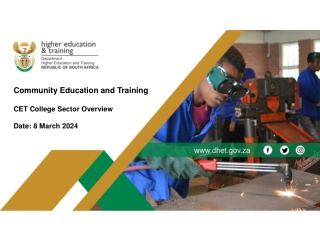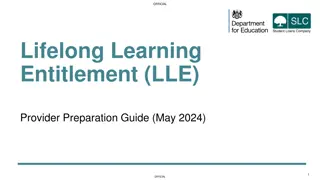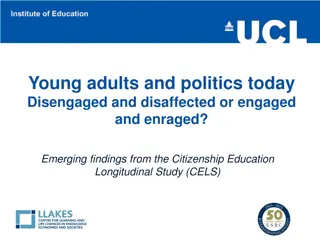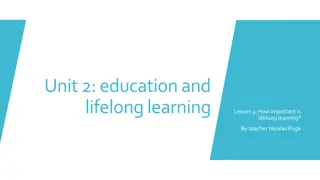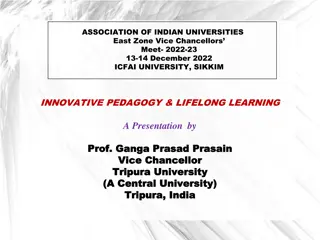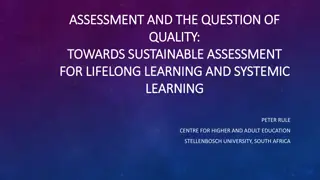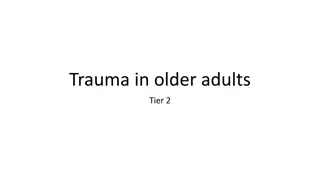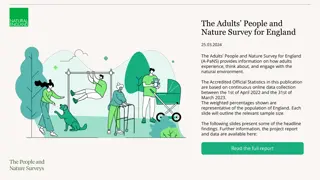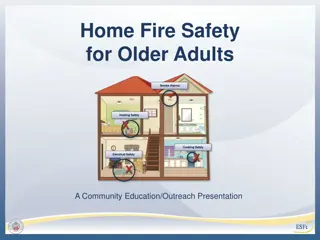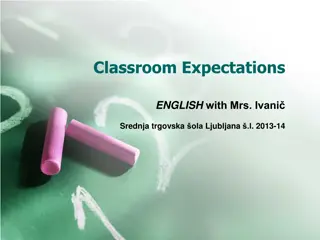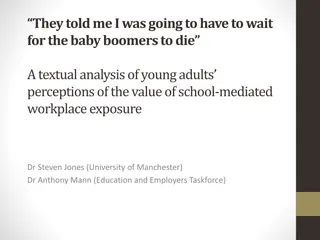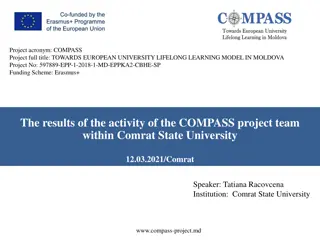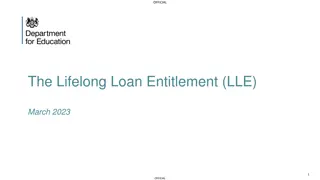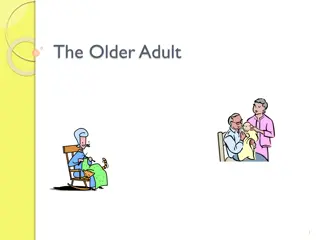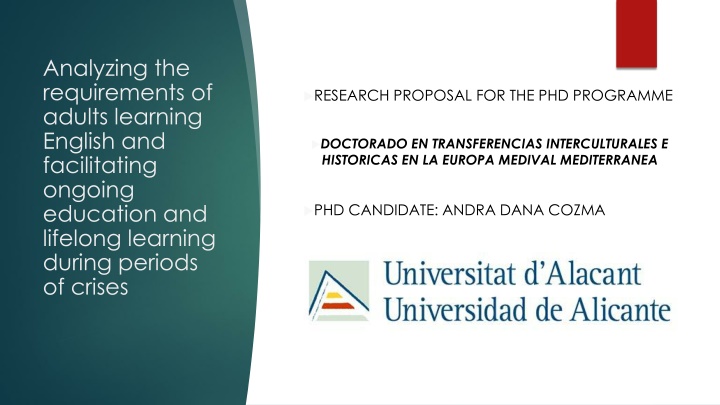
English Language Learning Needs of Adult Students During Crises
Explore the EFL learning needs of adults facing crises like the pandemic and war, focusing on attitudes, expectations, and learning styles during continuous education. Investigate the evolving role of educators in multicultural societies impacted by worldwide crises.
Download Presentation

Please find below an Image/Link to download the presentation.
The content on the website is provided AS IS for your information and personal use only. It may not be sold, licensed, or shared on other websites without obtaining consent from the author. If you encounter any issues during the download, it is possible that the publisher has removed the file from their server.
You are allowed to download the files provided on this website for personal or commercial use, subject to the condition that they are used lawfully. All files are the property of their respective owners.
The content on the website is provided AS IS for your information and personal use only. It may not be sold, licensed, or shared on other websites without obtaining consent from the author.
E N D
Presentation Transcript
Analyzing the requirements of adults learning English and facilitating ongoing education and lifelong learning during periods of crises RESEARCH PROPOSAL FOR THE PHD PROGRAMME DOCTORADO EN TRANSFERENCIAS INTERCULTURALES E HISTORICAS EN LA EUROPA MEDIVAL MEDITERRANEA PHD CANDIDATE: ANDRA DANA COZMA Universidad de Alicante / Unviersitat d'Alacant
Few words about myself Academic background Proffesional background
CONTEXT AND PURPOSE OF THE RESEARCH Context of the research: TEFL (Teaching English as a Foreign Language) to adults in the context of continuous education during difficult times Adapt the teaching methods and design materials according to the curriculum guidelines and to the unique characteristics of the specific group of learners Purpose of the research: to discover the English as a Foreign Language (EFL) learning needs of adults who attend courses in Greece and other European countries during the process of continuous education and lifelong learning in multicultural societies affected by crises (e.g. the Covid-19 crisis, the humanitarian crisis provoked by the war in Ukraine) to examine how the role of adult educators that teach English language courses changed because of different world-wide crises(e.g. the Covid-19 pandemic crisis, the humanitarian crisis provoked by the war in Ukraine)
Theoretical and conceptual framework The term needs - umbrella term including the wants, the lacks, the requirements, the motivations, the expectations and the obstacles encountered in the learning process by the learners (Bridley, 1984). Adult learners - certain unique characteristics (Kokkos, 2000, Rogers, 2002, Sifakis, 2003): They bring with them experiences and knowledge and they feel the need to utilize these experiences as sources for learning They are active participants, responsible for their own learning and training and they must be actively involved in the process of syllabus design They come back to education with specific goals and have specific expectations about the learning process They acquire new knowledge in their own way, using different strategies for learning and exhibiting various learning styles They have competing interests and they encounter obstacles or difficulties in the education process
Research questions Main question Which are the EFL(English as a Foreign Language) learning and educational needs of adult students in the context of continuous education during difficult times (pandemic and war in Ukraine)? Subquestion 1 Which are the attitudes, wants and expectations of adult students towards English language learning when they return to education during difficult times (pandemic and war in Ukraine)? Subquestion 2 What are the EFL(English as a Foreign Language) learning styles of adult students that return to education during difficult times (pandemic and war in Ukraine)? Subquestion 3 What EFL (English as a Foreign Language) learning strategies adult learners prefer to use when returning to education during difficult times (pandemic and war in Ukraine)? Subquestion 4 What are the lacks and obstacles encountered by adult students in learning English in the context of continuous education during difficult times (pandemic and war in Ukraine)? Subquestion 5 How does the English teacher contribute to the processes of continuous education of adult students during difficult times (pandemic and war in Ukraine?
Research strategy Descriptive research exploring the EFL (English as a Foreign Language) learning needs of different groups of adult students coming from different societies and affected by multiple crises A quantitative methodological approach is favored because the main aim of the study is to obtain answers to the same questions from a representative majority of individuals enrolled in English language courses in Greece and other European countries. WHY using a quantitative methodology? more control over how the data will be gathered and interpreted the data will be more precise, reliable, consistent and numerical arrange the data using simple analytical methods the data will have the form of numbers and statistics, arranged in tables or charts the data analysis will be relatively less time consuming using a statistical software
Research methodology Data collection process Identify the variables select the sample population choose appropriate collection methods for data the pilot study modifying, if needed, the collection methods and the different variables collecting the data - Questionnaire
Research methodology Foreseeable problems Access to collecting the necessary data to the groups of adult learners Ethical issues - related to the people, the institutions and the information that need to be collected Participants will be assured of anonymity and confidentiality throughout the stages of the research process. Informed consent will be obtained prior to the fulfilment of the questionnaires. If requested, the results of the study will be shared with the respondents. Personal safety - The target population is located inside different public institutions, and the individuals will complete the questionnaires during one of their English class
Research methodology Research tool - The questionnaire Will include closed-types questions, which will be quick to complete and straightforward to code afterwards: multiple-choice questions category questions ranking questions rating-scales questions Will include five sections: Section 1: information related to demographic data such as age, gender, education, languages the respondents speak and current work situation, country of origin Section 2: respondents will express their attitudes, wants and expectations towards English language learning when they return to education during difficult times Section 3: the respondents learning styles, preferences and strategies used when learning English while having to cope with different humanitarian crises Section 4: difficulties (lacks and obstacles) respondents encounter in learning the English language in the context of continuous education during difficult times Section 5: respondents rank different English language skills according to degrees of importance and degrees of difficulty to learn the foreign language
Research methodology Analysis of the research data Statistical Package for Social Sciences software (SPSS) descriptive and inferential statistics procedures the results will be presented in the form of tables, graphics and written work Reliability and validity Reliability refers to the consistency and accuracy of the results and their replicability in similar conditions - for the present research reliability cannot be proven. Validity assesses the suitability of the research tool and determines whether it measures what is supposed to be measuring - Validity might be improved through careful sampling, appropriate instrument implementation and appropriate statistical analysis of the data
PhD Program "Doctorado en transferencias Interculturales e historicas en la europa Medival Mediterranea" (March 2022- March 2025) Phases Duration Activities I March 2022 December 2022 Literature Review. Learning descriptive and inferential statistics and SPSS. Consult with the supervisor about the literature review and the development of the questionnaire. Create the questionnaire. Pilot the questionnaire. Complete literature review. Modify if needed and finish Timetable II January - August 2023 questionnaire design. Distribute the questionnaire to the groups of learners and complete the primary data collection of the research. Further development of the research design. Continue learning descriptive and inferential statistics and SPSS. III September December 2023 Complete the analysis with SPSS of the primary data. IV January 2024 February 2025 Write the full report on the findings, including conclusions, implications and recommendations. Consult the finished research with the supervisor in order to make the last improvements. V March 2025 Submit the dissertation
REFERENCES Abu-Snoubar, T. (2017) An Evaluation of EFL Students Attitudes Toward English Language Learning In Terms Of Several Variables. International Journal of English Language Teaching 5(6): 18-34 at https://www.researchgate.net/publication/320467751_An_Evaluation_of_EFL_Students'_Attitudes_ toward_English_Language_Learning_In_Terms_of_Several_Variables Ahmed, S. (2015) Attitudes towards English Language Learning among EFL Learners at UMSKAL. Journal of Education and Practice 6(18): 6-16 at www.iiste.org Athanasiou, A. et all (2014) - . Frederick, 1-70 Burgess, T. (2001) A general introduction to the design of questionnaires for survey research 1.1. University of Leeds, 1-27 Creswell, J. (2015) Educational research: Planning, conducting, and evaluating quantitative and qualitative research (5th ed.). Boston, MA: Pearson
REFERENCES EAEA (2022), European Association for the Education of Adults, Available at: https://eaea.org/our-work/projects3/lse-database-good-practice-public-second- chance-schools-public-adult-education-school/. Kazantzi, . & Zafiri, . (2019) EFL at Greek Second Chance Schools: Examining the Learning Needs of Muslim Adult Learners. World Journal of English Language 9(2): 74-87 at http://wjel.sciedupress.com Leung, W. (2001) How to design a questionnaire. Student BMJ 9: 187-189 MINISTRY OF EDUCATION, RESEARCH AND RELIGIOUS AFFAIRS. Teaching of English per levels of competency. Government Gazette, 2/2732. Athens: Greece. Available at: http://www.minedu.gov.gr/publications/docs2016/aggliki.pdf.
REFERENCES Sabah, A. & Ibrahim, M. (2016) ESP Needs Analysis: A Case Study of PEH Students, University of Khartoum. Sino-US English Teaching 13(12): 905-923 at https://www.researchgate.net/publication/311972551_ESP_Needs_Analysis_A_Case _Study_of_PEH_Students_University_of_Khartoum Tipas et all (2014) - . , at www.eoppep.gr Tzotzou, M. (2014) Designing and administering a needs analysis survey to primary school learners about EFL learning: A case study. Preschool & Primary Education 2(1): 59-82 at https://www.researchgate.net/publication/268811602_Designing_and_Administering _a_Needs_Analysis_Survey_to_Primary_School_Learners_about_EFL_learning_a_Cas e_Study

